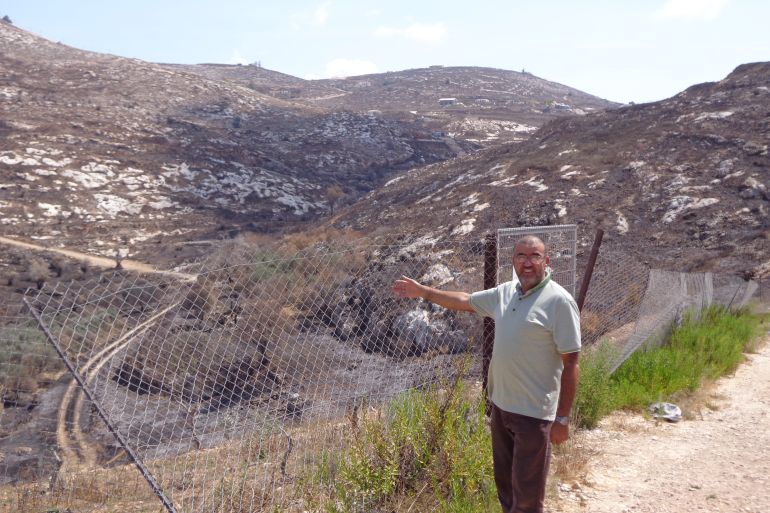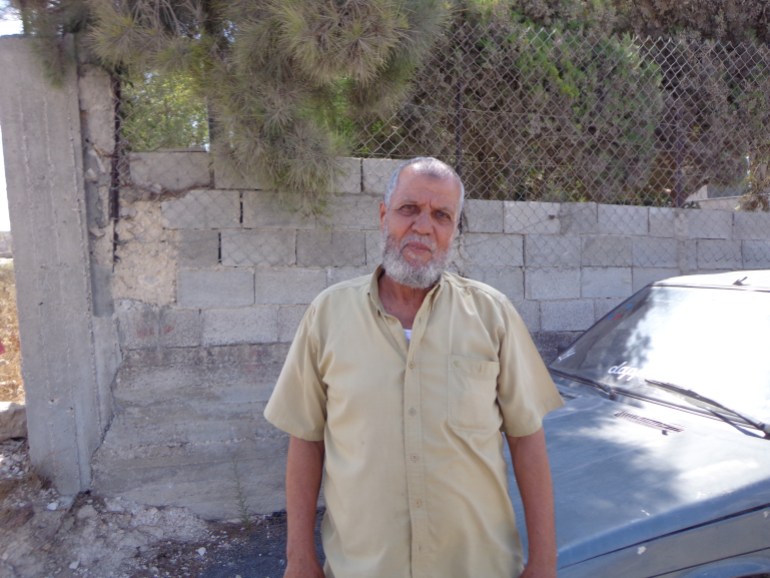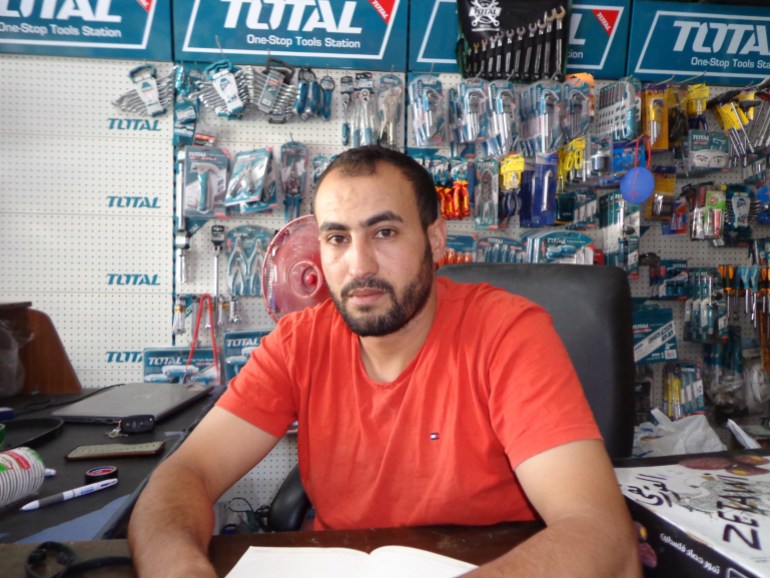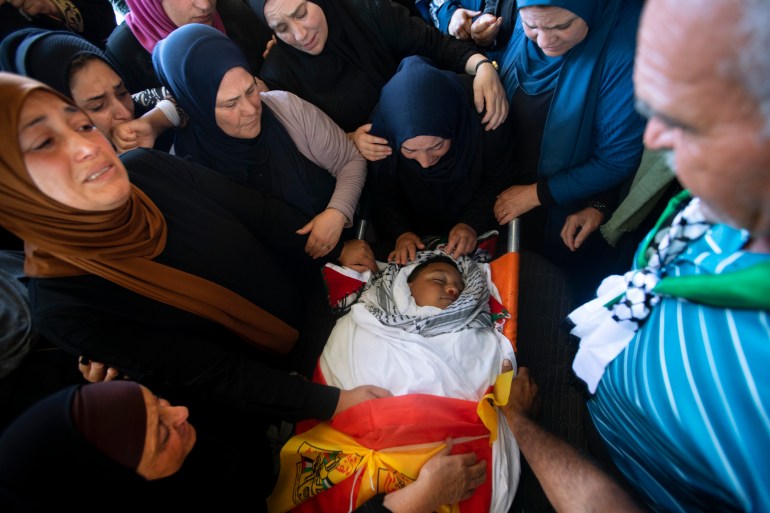Helping hand: Israeli forces in the service of Jewish settlers
Palestinians in the south of Nablus’s Urif village fear for their lives as attacks by illegal Jewish settlers surge and Israeli troops assist.

Urif, Occupied West Bank – The villagers of Urif live in fear for their lives and property as illegal settlers on a nearby hill – and the Israeli forces backing them – continue to terrorise the area.
“We never know when the next attack will be, what damage the settlers will cause, and whether they will kill somebody,” said Samir Sawalma, 65, whose home is located on the edge of the village nearest to the Israeli settlement of Yitzhar.
Keep reading
list of 4 itemsIsraeli troops kill Palestinian teenager in occupied West Bank
Palestinian shot by Israeli army in Gaza Strip dies
In Pictures: Palestinians protest in Gaza Strip
“The settlers raided the village last week, accompanied by soldiers, and set fire to our olive orchards and chopped down some trees that had taken decades to grow,” Sawalma told Al Jazeera.
The windows of the Sawalnas’ home are covered in metal grilles and a high wall surrounds the house since it was attacked by settlers who smashed its windows and the windows of Samir’s car parked outside.
Other buildings in the Palestinian village, south of Nablus in the occupied West Bank, are similarly fortified; the school has a special roof to prevent damage from settler stones, while one family simply abandoned their house, unable to deal with the constant violence.

Municipal employee Amer Safadi said he has had to go to the village’s outskirts often to repair the water tank after settlers shot holes in it.
“I’m worried about getting shot again after I was shot several years ago by the settlers with the bullet still lodged in my arm,” Safadi told Al Jazeera.
The daily lives of many Palestinian villagers all over the West Bank are at the mercy of settlers – and the Israeli soldiers who support them – as the settlers cut down olive trees, burn agricultural fields, assault Palestinians and, in a growing number of cases, shoot at them – killing some and leaving others hospitalised.
While the soldiers are meant to protect both Israelis and Palestinians, over the years, human rights organisations – Israeli and international – have documented numerous cases where troops, in the best-case scenarios, stand by while settlers rampage.
In the worst-case scenarios, Israeli forces encourage the settlers to attack and then defend them by shooting at Palestinians who try to protect their villages.
Recently, Israeli rights group B’Tselem released a video of an Israeli soldier giving his gun to a settler in the southern West Bank who then shot at Palestinians.
“Violence by settlers [and sometimes by other Israeli civilians] toward Palestinians has long since become part of daily life under occupation in the West Bank,” said B’Tselem.
“These actions range from blocking roads, throwing stones at cars and houses, raiding villages and farmland, torching fields and olive groves, and damaging crops and property to physical assault, sometimes to the point of hurling Molotov cocktails or using live fire,” said the organisation.
Israeli troops ‘encouraging settlers’
Over the years, Urif has paid a high price for being located near Yitzhar, which started as a military post in 1983 before being handed over to religious settlers and is now home to a yeshiva (Jewish educational institution) known for its ultranationalism.
The settlers have the messianic belief that they are entitled to drive Palestinians off their land and are religiously sanctioned to carry out violent assaults.
During Israel’s assault on Gaza in May, a wave of anger swept over the West Bank following Israel’s ferocious bombing of the besieged coastal enclave, with Palestinians taking to the streets to protest.
Nidal Safadi died when a group of settlers and soldiers shot him four times on May 14 – the fifth day of the assault – after villagers confronted illegal settlers who raided the area, uprooted olive trees, and stoned the school, breaking solar panels.
“I heard the soldiers encouraging the settlers in Hebrew to attack, they were coordinating the assault with the settlers,” said Sawalma.
A video shot by B’Tselem shows a shirtless settler, his face covered, talking to soldiers before he opens fire on the Palestinians with an automatic weapon while other photos show both soldiers and settlers with their firearms raised.
“My brother died almost immediately,” Nidal’s brother Mustafa Safadi told Al Jazeera. “Nidal, who used to lay concrete floors for a living, was a quiet man who didn’t like confrontations and only went to help defend the village from the attack.
“He was the father of two children and his wife was five months pregnant at the time and had to be sedated due to her stress. I’m now their only source of financial support, in addition to having to provide for my own five children,” said Safadi.

Nidal Safadi was not the only Palestinian to die on that fateful day in May following other confrontations provoked by settlers invading neighbouring villages and attacking Palestinians and their property.
In Asira al-Qibliya, Hussam Asaira, 19, was shot dead while Awad Harb, 27, was killed in Iskaka village.
In Al Reihiya village south of Mount Hebron, Ismail al-Tubasi, 27, was also killed in similar circumstances.
Urif was quiet that day, as were other nearby villages. Nevertheless, settlers raided the area, leading to confrontations in which Israeli troops supported the assailants.
No punishment
What has emboldened the settlers is not only the military protection of the Israeli soldiers, and the economic and moral support of Israel’s successive pro-settlement governments, but also the lack of legal consequences.
B’Tselem reported that settlers seldom face any legal consequences for their behaviour, that in most cases – even if investigations were opened – no action was ever taken against the perpetrators.
After a 10-year study, Israeli rights group Yesh Din reported (PDF) in 2015 that 85 percent of investigations into such cases – including violence, arson, damage to property, mutilation of trees, and the takeover of land – ended with no punishment handed down. The odds of a police complaint filed by a Palestinian resulting in the conviction of an Israeli civilian were a mere 1.9 percent, it said.

While settler violence has been ongoing for decades, the situation seems to have worsened this year, observers say.
“Violence by Israeli settlers against Palestinian civilians in the occupied West Bank has risen markedly in recent months, with assaults and property destruction occurring in an atmosphere of impunity,” reported the UN Office of the High Commissioner for Human Rights (OHCHR) in April.
“They primarily target the livelihoods of rural Palestinians, vandalising livestock, agricultural lands, trees and homes,” said OHCHR.
“Besides the presence and expansion of Israeli settlements, which are intended to establish illegal claims for Israeli sovereignty, settler violence is meant to make the daily lives of Palestinians untenable.”
Even some Israeli soldiers are perturbed by the growing violence, with a group of 100 sending a letter to Israeli defence minister Benny Gantz in July urging action against settlers they witnessed provoking violence with Palestinians.